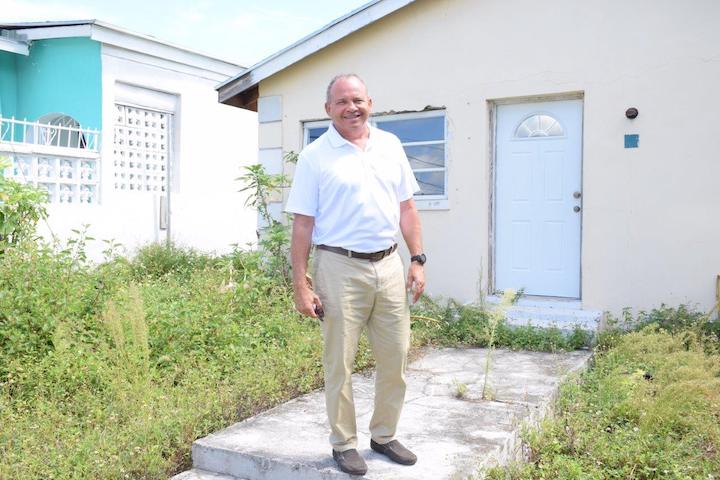|

|
 |
|
Last Updated: Sep 16, 2019 - 12:12:54 AM |

Foreclosed properties like the one above that are sitting vacant could be the perfect solution
for immediate housing for persons displaced by Hurricane Dorian, according to real estate
broker and entrepreneur Mario Carey, pictured.
|
Thousands of repossessed properties sit vacant while thousands who lost their homes as Hurricane Dorian thrashed Abaco and Grand Bahama are sleeping in shelters, desperate for some semblance of a return to normalcy.
Now, says leading real estate broker and entrepreneur Mario Carey, as government searches for a solution to housing the answer may be staring them right in the face – incentivize investors to buy distressed properties and transform them into rent-controlled, affordable housing.
“There are so many who lost loved ones or everything they had,” said Carey, founder and president of Better Homes and Gardens MCR Bahamas Group. “Even as the tragedy continues to unfold, we need to develop a plan for moving forward, and that plan has to include housing in Nassau or elsewhere as well as rebuilding in Grand Bahama and Abaco.”
Among the top priorities, said Carey, is housing.
“One of the first goals must be to find housing for the people who have been displaced whether they are staying with those who opened their homes to them on a temporary basis or in a shelter,” said Carey. “We need a longer-term solution and we have that solution. We have the inventory. It is sitting in bank foreclosures, maybe as many as 5,000 properties.”
Carey says it behooves banks and financial institutions holding foreclosed properties to come together, organize a pool of properties, invite investors to ‘buy in bulk’ and establish low rental rates which will be covered in the short term by subsidies.
“Many foreclosed properties need to be renovated. They need to be occupied,” Carey said. “Unoccupied properties are at greatest risk for losing value so it makes sense when we are desperate for places for people to live to place them in a property that is sitting there, unoccupied, most likely depreciating in value as time passes. Long-term, the houses, condos and apartments that are purchased at sale value, not market value, will be a good investment for the investor or group which purchases multiple units.”
To make repossessed property purchases more palatable, Carey suggests waiving any costs or fees associated with the sale so long as the property is used for rent-controlled, affordable housing.
While adequate inventory for housing exists in New Providence, Exuma and a few other islands, encouraging new building or extensive repairs in Grand Bahama and Abaco, islands most severely impacted by Hurricane Dorian, will require a serious look at how projects are approved.
“Government needs to ensure that the same building codes that are in place in Nassau are equally imposed in Grand Bahama and Abaco, but once projects are proposed, they need to be reviewed, amended or approved with all due speed and efficiency, slicing through the red tape and putting out a welcome mat,” Carey said. “We should still require an environmental impact assessment and an environmental management plan but no developer who is willing to take the risk of building should have to pay any government fees.”
All home improvement projects should be stamp duty exempt, says Carey, who two years ago presented an idea for a full disaster relief plan that included making The Bahamas the disaster relief capital of the region. He called for hundreds of acres off Gladstone Road in the heart of the inland New Providence to be dedicated to a full relief and recovery headquarters with ready-to-go housing, food pantries, medical supplies, personal goods and heavy equipment. As needs arose, supplies could be shipped from a single location with strong inventory controls or evacuees could be moved to the inland location.
“Disaster relief, rebuilding and recovery have become the single largest cost that The Bahamas and other countries and island nations in the region face," said Carey. "In some places, it has been estimated that countries will have to spend up to 30 percent of their budgets rebuilding from a single natural disaster." Those costs are expected to increase, he notes, with warming waters and rising seas associated with climate change creating conditions favourable to stronger storms.
“Every step we take now in the recovery process following the passage of Dorian should be geared toward putting lives back on track,” said Carey, whose 30+ year career in real estate as appraiser, broker, director and founder of two firms has given him a careful perspective on the role property plays in an economy. He has long argued that real estate and development should be recognized as the second pillar of the Bahamian economy. “Long-term recovery will be years in the making, but we have to start with the thought that everything we do once people have food and water should involve the basics of reasonable housing, job creation and attention to emotional recovery. We can do this. I know we can, but it takes a plan and it takes all of us working together to make that plan work.”

© Copyright 2019 by thebahamasweekly.com
Top of Page
|
|
 |

|
